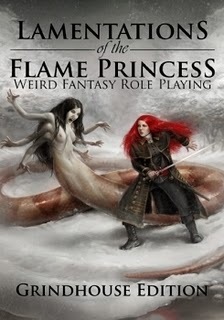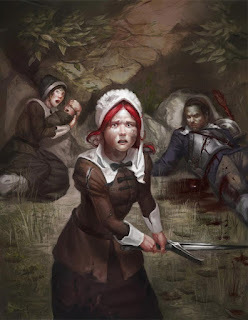Interview: James Edward Raggi IV (Part III)
Parts I and II of this interview can be found here and here, respectively.
7. In a media landscape increasingly shaped by risk-aversion and corporate IPmanagement, where do small, transgressive publishers like Lamentations of the Flame Princess fit in? Is there still aplace for the truly weird?
I said something a little earlier that's not as true as it used to be. While it is mostly true that peoplelook at the censorship of the past and think it was ridiculous, there's a creeping attitude rising upthat looks at some stuff from the 1970s on, wondering how they got away with doing what they did.Like somehow it is wrong these things exist.The '70s were wild for movies. I was too young to see anything in those days (well, I rememberStar Wars) but going back ... Blazing Saddles and Texas Chainsaw Massacre and Salò and PinkFlamingos and I Spit on Your Grave and Wizard of Gore and Ilsa: She Wolf ofthe SS and Clockwork Orange and Taxi Driver and Apocalypse Now and Exorcist and Death Wishand Last Tango in Paris and and and and and and ... you could just make the most outrageous stuff and somehow there was a way to get it done and get it to audiences. And not just on the lowestindependent level, either, there are some major films in just that list there.
There's a reason I called the second game box, the one after I realized I could do this full time, the“Grindhouse Edition.” This is the feel we're after. Anything can happen, and whether any particularwork falls within someone's parameters of good taste is not our concern.
Whether there is room for that today is entirely up to the public and their willingness to dig a littlebit to find it. It might not be on the most convenient platforms. You might even have to order directfrom the publisher. That's what allows this stuff to still exist now and into the future in a culturalclimate that seems to demand you conform to Group A or Group B's standards in order to have anaudience.
8. Do you think roleplaying games have a unique potential to explore uncomfortable ordisturbing subject matter, more so than, say, literature or film? If so, why?
I think they have less potential. RPGs are all location and situation and setup, and then it's throughplay that things actually happen. The “emergent story” format of RPGs means that whatever comesout at the end is something of an accident, or the result of a succession of coincidences.
Literature and film and any medium where someone has complete control over the flow of theentire story means they can take uncomfortable subjects and do different things with themdeliberately and drive the point home through narrative and thematic context.
If the typical RPG group comes across the goings-on in, say, Salò, there's going to be an explorationof a very different kind of violence than the film invites us to explore, I dare say.
9. Finally, if Lovecraft were alive today, do you think he’d approve of Lamentations ofthe Flame Princess? Or would he recoil in horror?
 The more interesting question is if Lovecraft were alive today, what would all these people who have appropriated his work and in some cases owe some substantial portion of their incomes to their use of his work, think of him?
The more interesting question is if Lovecraft were alive today, what would all these people who have appropriated his work and in some cases owe some substantial portion of their incomes to their use of his work, think of him?
Can you imagine Lovecraft stepping through a time portal from the mid-1930s, with all the attitudes from then intact, seeing what's become of his work, and deciding to try to get writing jobs from the publishers selling books based on his work? That would be much more amusing.
As for what Lovecraft would think of LotFP? Oh he'd hate it. He's from a wealthy family that fell on hard times, and apparently carried himself with a sort of upper class manner, thought of himself as a gentleman, and for the first forty years of his life he was deeply conservative, and I'm this racial mongrel (Italians and Poles were two immigrant groups he didn't much care for) kid from the projects who is a fan of and influenced by and I guess producing the lowest of the arts.
And one of those influences is the old pulp author H.P. Lovecraft. I love you, man.
7. In a media landscape increasingly shaped by risk-aversion and corporate IPmanagement, where do small, transgressive publishers like Lamentations of the Flame Princess fit in? Is there still aplace for the truly weird?
I said something a little earlier that's not as true as it used to be. While it is mostly true that peoplelook at the censorship of the past and think it was ridiculous, there's a creeping attitude rising upthat looks at some stuff from the 1970s on, wondering how they got away with doing what they did.Like somehow it is wrong these things exist.The '70s were wild for movies. I was too young to see anything in those days (well, I rememberStar Wars) but going back ... Blazing Saddles and Texas Chainsaw Massacre and Salò and PinkFlamingos and I Spit on Your Grave and Wizard of Gore and Ilsa: She Wolf ofthe SS and Clockwork Orange and Taxi Driver and Apocalypse Now and Exorcist and Death Wishand Last Tango in Paris and and and and and and ... you could just make the most outrageous stuff and somehow there was a way to get it done and get it to audiences. And not just on the lowestindependent level, either, there are some major films in just that list there.

There's a reason I called the second game box, the one after I realized I could do this full time, the“Grindhouse Edition.” This is the feel we're after. Anything can happen, and whether any particularwork falls within someone's parameters of good taste is not our concern.
Whether there is room for that today is entirely up to the public and their willingness to dig a littlebit to find it. It might not be on the most convenient platforms. You might even have to order directfrom the publisher. That's what allows this stuff to still exist now and into the future in a culturalclimate that seems to demand you conform to Group A or Group B's standards in order to have anaudience.
8. Do you think roleplaying games have a unique potential to explore uncomfortable ordisturbing subject matter, more so than, say, literature or film? If so, why?
I think they have less potential. RPGs are all location and situation and setup, and then it's throughplay that things actually happen. The “emergent story” format of RPGs means that whatever comesout at the end is something of an accident, or the result of a succession of coincidences.
Literature and film and any medium where someone has complete control over the flow of theentire story means they can take uncomfortable subjects and do different things with themdeliberately and drive the point home through narrative and thematic context.
If the typical RPG group comes across the goings-on in, say, Salò, there's going to be an explorationof a very different kind of violence than the film invites us to explore, I dare say.
9. Finally, if Lovecraft were alive today, do you think he’d approve of Lamentations ofthe Flame Princess? Or would he recoil in horror?
 The more interesting question is if Lovecraft were alive today, what would all these people who have appropriated his work and in some cases owe some substantial portion of their incomes to their use of his work, think of him?
The more interesting question is if Lovecraft were alive today, what would all these people who have appropriated his work and in some cases owe some substantial portion of their incomes to their use of his work, think of him?Can you imagine Lovecraft stepping through a time portal from the mid-1930s, with all the attitudes from then intact, seeing what's become of his work, and deciding to try to get writing jobs from the publishers selling books based on his work? That would be much more amusing.
As for what Lovecraft would think of LotFP? Oh he'd hate it. He's from a wealthy family that fell on hard times, and apparently carried himself with a sort of upper class manner, thought of himself as a gentleman, and for the first forty years of his life he was deeply conservative, and I'm this racial mongrel (Italians and Poles were two immigrant groups he didn't much care for) kid from the projects who is a fan of and influenced by and I guess producing the lowest of the arts.
And one of those influences is the old pulp author H.P. Lovecraft. I love you, man.
Published on August 16, 2025 21:00
No comments have been added yet.
James Maliszewski's Blog
- James Maliszewski's profile
- 3 followers
James Maliszewski isn't a Goodreads Author
(yet),
but they
do have a blog,
so here are some recent posts imported from
their feed.



